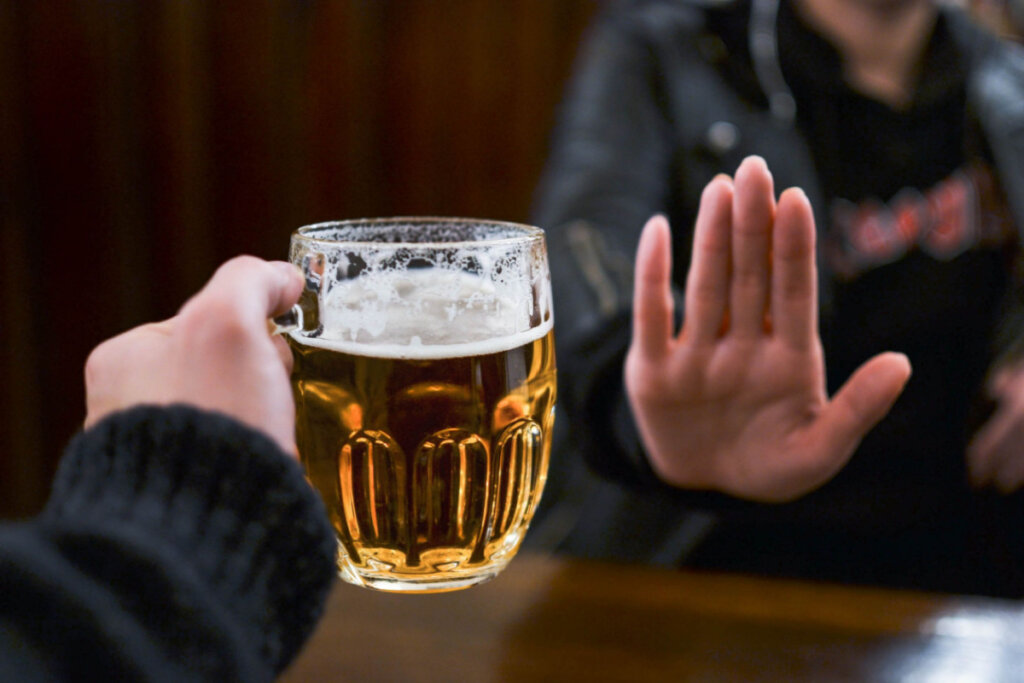Why Generation Z is the Soberest in History

Today, it’s not uncommon to find young people boasting about their reduced alcohol consumption either on social media or in person. Indeed, they tend to rave about their sober lives. In fact, we can say that Generation Z (those born between the late 90s and 2000s) is the soberest in history. But why?
Moreover, a study conducted in the United Kingdom states that abstinence is seen as an attribute among young people between 16 and 25 years of age and that not drinking improves their image.
However, if we look at previous generations, of those between the ages of 55 and 75 today, only 15 percent considered that they were teetotalers when they were young. More of the same is true in the United States, where the number of young people not drinking alcohol rose from 20 to 28 percent in a decade.

Generation Z: mindful drinkers
Generation Z has been the first –although not the only one– to accept challenges and hashtags that circulate on social media on the topic of alcohol consumption.
Labels like #alcoholfree or #soberlife help these young people take greater control of the alcohol they consume. Many of them aren’t teetotalers, but they consider themselves to be mindful drinkers. Others directly reduce their alcohol consumption because they want to take care of themselves.
Rosamund Dean (2017) coined the term mindful drinkers. In her book of the same name, she explains the strategies she put in place to avoid viewing alcohol consumption as a habit and a social obligation.
“I never wanted to stop drinking entirely, because I still enjoy having the occasional wine with dinner, or a glass of fizz when out with friends, but now I never overdo it” she claims.
The turning point that led Rosamund Dean to follow this strategy was motherhood. “First of all, being sober during pregnancy made me realize how much money I had been spending on wine.
And secondly, a hangover is really hard work when you have a toddler and a baby!” she explains. During this process, the writer learned that it’s often better to leave the consumption of certain drinks for important occasions.
Sober curious
Another tag that’s already become a category on networks like TikTok is #sobercurious. It’s a culture that invites young people to explore plans and modes of entertainment away from alcohol. On the aforementioned social media, we find hashtags such as #sobriety, #soberlife, #alcoholfree, and #sobrietyforwomen.
The concept was first mentioned in 2018 in the book, Sober Curious, written by the English writer Ruby Warrington. She claims that her alcohol consumption in the past was really controlled.
She didn’t drink for two days in a row and never ended up completely drunk. Even so, she had two problems. She drank more than she wanted to and she couldn’t say no.
“Drinking less allows you to make better decisions about how you spend your time, with the added bonus of zero hangover.”
-Rosamund Dean-
Warrington’s book includes a series of questions and reflections to help us control our relationship with alcohol. In fact, she invites us to question each of the impulses that lead us to drink. “Why this beer and why now?” the writer asks.
Years later, Warrington founded Club Soda, a group of establishments and an online community that invites people to train to become teetotal or, failing that, to drink in moderation.
About half of its 70,000 members are more interested in controlled drinking than in becoming absolute teetotalers. The rapid growth of this community in the United States is due to an entire generation (Generation Z) that’s concerned about the impact of these types of drinks on their mental health.

Is reducing alcohol consumption enough?
The idea of moderate consumption became popular after the pandemic, at which time the figures for home alcohol consumption skyrocketed at home. The IRI consultancy published a study that compared the sales of alcoholic beverages, salty snacks, sweets, and chocolates in different European countries.
It revealed that beer sales all over Europe increased during the pandemic, with Spain, the Netherlands, and the UK the countries with the largest sales growth.
Faced with the idea of drinking in moderation, experts are increasingly clear that the only healthy option is abstinence. According to a study published in 2021 by The Lancet Oncology, so-called moderate consumption (less than two beers a day) causes more than 100,000 cancers a year.
There are many challenges and activities that circulate on social media with hashtags such as #sobercuriousor the previously mentioned #alcoholfree.
It’s a trend that invites young people to question their consumption habits as well as the social pressure surrounding alcohol.
However, according to experts, there’s no better strategy than zero consumption. Indeed, alcohol isn’t a matter of balance or moderation. The only truly healthy and transgressive action to take is not to drink at all.
Today, it’s not uncommon to find young people boasting about their reduced alcohol consumption either on social media or in person. Indeed, they tend to rave about their sober lives. In fact, we can say that Generation Z (those born between the late 90s and 2000s) is the soberest in history. But why?
Moreover, a study conducted in the United Kingdom states that abstinence is seen as an attribute among young people between 16 and 25 years of age and that not drinking improves their image.
However, if we look at previous generations, of those between the ages of 55 and 75 today, only 15 percent considered that they were teetotalers when they were young. More of the same is true in the United States, where the number of young people not drinking alcohol rose from 20 to 28 percent in a decade.

Generation Z: mindful drinkers
Generation Z has been the first –although not the only one– to accept challenges and hashtags that circulate on social media on the topic of alcohol consumption.
Labels like #alcoholfree or #soberlife help these young people take greater control of the alcohol they consume. Many of them aren’t teetotalers, but they consider themselves to be mindful drinkers. Others directly reduce their alcohol consumption because they want to take care of themselves.
Rosamund Dean (2017) coined the term mindful drinkers. In her book of the same name, she explains the strategies she put in place to avoid viewing alcohol consumption as a habit and a social obligation.
“I never wanted to stop drinking entirely, because I still enjoy having the occasional wine with dinner, or a glass of fizz when out with friends, but now I never overdo it” she claims.
The turning point that led Rosamund Dean to follow this strategy was motherhood. “First of all, being sober during pregnancy made me realize how much money I had been spending on wine.
And secondly, a hangover is really hard work when you have a toddler and a baby!” she explains. During this process, the writer learned that it’s often better to leave the consumption of certain drinks for important occasions.
Sober curious
Another tag that’s already become a category on networks like TikTok is #sobercurious. It’s a culture that invites young people to explore plans and modes of entertainment away from alcohol. On the aforementioned social media, we find hashtags such as #sobriety, #soberlife, #alcoholfree, and #sobrietyforwomen.
The concept was first mentioned in 2018 in the book, Sober Curious, written by the English writer Ruby Warrington. She claims that her alcohol consumption in the past was really controlled.
She didn’t drink for two days in a row and never ended up completely drunk. Even so, she had two problems. She drank more than she wanted to and she couldn’t say no.
“Drinking less allows you to make better decisions about how you spend your time, with the added bonus of zero hangover.”
-Rosamund Dean-
Warrington’s book includes a series of questions and reflections to help us control our relationship with alcohol. In fact, she invites us to question each of the impulses that lead us to drink. “Why this beer and why now?” the writer asks.
Years later, Warrington founded Club Soda, a group of establishments and an online community that invites people to train to become teetotal or, failing that, to drink in moderation.
About half of its 70,000 members are more interested in controlled drinking than in becoming absolute teetotalers. The rapid growth of this community in the United States is due to an entire generation (Generation Z) that’s concerned about the impact of these types of drinks on their mental health.

Is reducing alcohol consumption enough?
The idea of moderate consumption became popular after the pandemic, at which time the figures for home alcohol consumption skyrocketed at home. The IRI consultancy published a study that compared the sales of alcoholic beverages, salty snacks, sweets, and chocolates in different European countries.
It revealed that beer sales all over Europe increased during the pandemic, with Spain, the Netherlands, and the UK the countries with the largest sales growth.
Faced with the idea of drinking in moderation, experts are increasingly clear that the only healthy option is abstinence. According to a study published in 2021 by The Lancet Oncology, so-called moderate consumption (less than two beers a day) causes more than 100,000 cancers a year.
There are many challenges and activities that circulate on social media with hashtags such as #sobercuriousor the previously mentioned #alcoholfree.
It’s a trend that invites young people to question their consumption habits as well as the social pressure surrounding alcohol.
However, according to experts, there’s no better strategy than zero consumption. Indeed, alcohol isn’t a matter of balance or moderation. The only truly healthy and transgressive action to take is not to drink at all.
All cited sources were thoroughly reviewed by our team to ensure their quality, reliability, currency, and validity. The bibliography of this article was considered reliable and of academic or scientific accuracy.
- University of Michigan. (2020, October 12). More young adults are abstaining from alcohol. ScienceDaily. Retrieved November 15, 2022 from www.sciencedaily.com/releases/2020/10/201012120007.htm
- idUS – Tendencias en el consumo de alcohol en los adolescentes escolarizados españoles a lo largo de la primera década del siglo XXI. (2016, 15 enero). idUS – Depósito de Investigación Universidad de Sevilla. https://idus.us.es/handle/11441/32675
- Rumgay, H. (2021, 1 agosto). Global burden of cancer in 2020 attributable to alcohol consumption: a population-based study. The Lancet Oncology. https://www.thelancet.com/journals/lanonc/article/PIIS1470-2045(21)00279-5/fulltext
- Análisis del gran consumo en siete países europeos. (s. f.). revistainforetail.com. https://www.revistainforetail.com/noticiadet/analisis-del-gran-consumo-en-siete-paises-europeos/e5e11c58971ada89b49a76bf06ee87c4
This text is provided for informational purposes only and does not replace consultation with a professional. If in doubt, consult your specialist.







